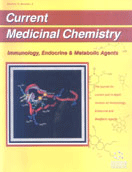Abstract
Aspirin and conventional nonselective nonsteroidal anti-inflammatory drugs (NSAIDs) have been widely prescribed for the treatment of musculoskeletal disorders with a major dose limiting gastrointestinal toxicity. However the discovery of inducible second isozyme of cyclooxygenase-2 (COX-2) opened up a new era in therapeutics. The selective COX-2 inhibitors have emerged as a class of compounds for the treatment of inflammatory disorders based on the molecular knowledge, characterization of two distinctive isozymes namely the constitutive cytoprotective cycloooxygenase-1 (COX-1) and the inducible inflammatory COX-2.The current hypothesis is that anti-inflammatory effects are mediated through the inhibition of COX-2 derived inflammatory prostaglandins (PGs), on the contrary the gastrointestinal adverse effects were due to inhibition of constitutive COX-1. The rationale approach is that the selective COX-2 inhibitors may provide a significantly improved gastrointestinal risk-benefit ratio over NSAIDs. However, the withdrawal of Vioxx by Merck & Co from worldwide markets has triggered a debate on the safety of this class as it was observed, that selective inhibition of COX-2 could lead to an imbalance of normal homeostasis resulting in potential cardiovascular risks. Evidence is emerging that the constitutively expressed COX-2 has important role in gastric mucosal protection, renal and the cardiovascular homeostasis. Suppression of endothelial prostacyclin (PGI2) by highly selective COX-2 inhibitors could lead to myocardial infarction and stroke implicating that COX-2 may have a pivotal role under certain physiological conditions.
Keywords: coxibs, prostaglandins, nsaids, cyclooxygenase, vioxx, etoricoxib, cox inhibitors, cox
 5
5








